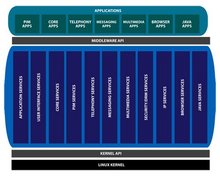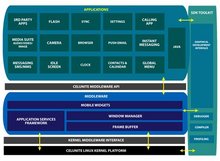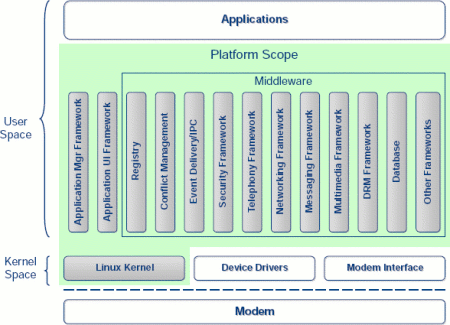Celunite changes name, announces LiMO CIE win
Jan 8, 2008 — by Eric Brown — from the LinuxDevices Archive — 5 views Linux mobile phone software and services provider Celunite has changed its name to Azingo, and will contribute components to the Linux Mobile Foundation's common integration environment (CIE), it said. Additionally, LiMo announced several new members, including Acrodea, ETRI, Huawei, Purple Labs, and most notably, Trolltech.
Linux mobile phone software and services provider Celunite has changed its name to Azingo, and will contribute components to the Linux Mobile Foundation's common integration environment (CIE), it said. Additionally, LiMo announced several new members, including Acrodea, ETRI, Huawei, Purple Labs, and most notably, Trolltech.
(Click for larger view of Azingo Mobile's application screen)
Azingo is based in Silicon Valley, with development offices in India. It changed its name from Celunite last week.
Azingo says it was selected by LiMO to supply components of the LiMO CIE, which is used by handset manufacturers and other LiMO members to develop and test future releases of the LiMO platform. LiMO is an industry group working to build a common, Linux-based mobile phone OS that will be licensed within the membership under “fair and nondiscriminatory” license terms. Thus, being part of the CIE could give Azingo a foot in the door, in terms of selling its software and services into forthcoming phones based on the LiMO platform.
Specific Azingo components selected for inclusion in the CIE reportedly include a software phone emulator, testing and bug tracking tools, and software management tools. Additionally, Azingo will offer reference mobile phone applications that use the LiMo application programming interfaces (APIs), as well as integration services around the LiMO Platform.


Azingo's middleware and application stacks
(Click either diagram to enlarge)
Azingo maintains its own Linux kernel for mobile phones. However, in September, it partnered with Wind River in a deal aimed at integrating Azingo middleware and applications with Wind River's kernel as well.
Both Wind River and Azingo (then Celunite) joined LiMo as core members this summer, along with Wind River rival Montavista and ten other new members. Subsequently, LiMO last month announced that Wind River would provide tools and low-level components for the LiMO CIE. Wind River's contribution to the CIE includes a build and configuration system, mobile-optimized kernel distribution, and the tool chain from Platform for Consumer Devices - Linux Edition (PCD-LE).

LiMo platform architecture
Stated Morgan Gillis, LiMo's executive director, “LiMo selected Azingo because its technology is ideally suited to managing, integrating, and testing an advanced mobile phone platform.”
Other new LiMO members
In related news, LiMo announced several new members, including:
- Acrodea, a vendor of UI middleware for phones
- ETRI (Electronics and Telecommunications Research Institute), a Korean government-sponsored non-profit organization
- Huawei, an infrastructure and handset manufacturer in China
- Purple Labs, a French mobile phone integrator
- Trolltech, a vendor of development tools and mobile Linux stacks
Trolltech, which sells the Qtopia Phone Edition (QPE) phone stack, has apparently quit LiPS to join LiMo. LiPS and LiMO still maintain some members in common, however, including Huawei and Purple Labs.
LiMO was founded in January 2007 by Motorola, NEC, NTT DoCoMo, Panasonic Mobile Communications, Samsung Electronics, and Vodafone in order to lower mobile development costs and increase Linux market share in mobile devices via standardization. Pre-dating LiMo was the Linux Phone Standards (LiPS) Forum, which in December announced the first release of its official standard for Linux in mobile phones. Unlike the OHA and LiMo, which are writing actual code for cross-licensing among members, LiPS is positioned as more of a formal standards-setting body.
Another player in the emerging battle for Linux-based mobile phone standardization is the Google-sponsored Open Handset Alliance (OHA), which this Fall announced its Android Java application stack and development tools for Linux-based mobile phones. Wind River also participates in the OHA.
This article was originally published on LinuxDevices.com and has been donated to the open source community by QuinStreet Inc. Please visit LinuxToday.com for up-to-date news and articles about Linux and open source.